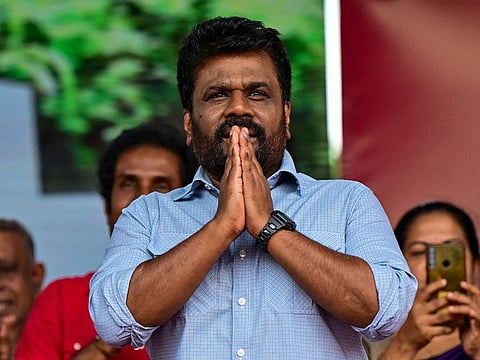New leadership sparks hope for Sri Lanka’s future
The island nation embarks on reforms to revive its ailing economy

Nov. 21 in Sri Lanka was an unusual day — went beyond the earlier inaugural sittings of the new parliament. A week earlier the embattled and yet optimist Sri Lankan people had overwhelmingly voted National People’s Power (NPP) into majority, winning 159 out of 225 seats in the parliament.
The party had only 3 seats in the previous parliament. That a record 175 of the 225 were first time lawmakers underscores the change Sri Lanka has seen after the tumultuous politics of the last three years.
The new parliament comprises academics, doctors, lawyers, small businessmen, women, sportspeople, artists and more. Ranging between mid 30s to mid-60s these people represent a new breed that has overturned the long-entrenched interest based dynastic politics in Sri Lanka. This is the first time a single party claimed two-thirds majority in the Sri Lankan parliament.
The parliamentary victory followed the win of the rank outsider leftist Anura Kumara Dissanayake representing NPP, who topped the presidential polls in elections held in September defeating the entrenched political players.
Magnitude of expectations
The 55-year-old Dissanayake gained the political mileage because of his sharp contrast with the other candidates and their partners. He was the man of the people with rural background pitted against dynasts that have dominated Sri Lankan politics for decades
To be able to govern in pursuit of his agenda, President Dissanayake had little choice except to dissolve the parliament where the NPP had only 3 seats.
The scale of President’s win and that of his NPP candidates is matched by the magnitude of expectations from the government that has no previous experience of running the country.
It is still a honeymoon period and the voters are counting on the NPP to deliver on its campaign promises of cracking down on corruption, improve the economy battered by mismanagement and restore ethnic peace in the country.
Opening the parliament the President said, “we can have different political ideologies … We will not give in to racist politics in our country again,” adding that the “election has shown that a very strong opportunity has now been created to build national unity.”
Overruling objections from the military he has offered an olive branch to the Tamil community, still reeling 15 years after the end of the bloody civil war, by ordering reopening of a road to Tamil areas.
“The size of the NPP’s mandate gives them the moral and political power to deliver on their promises,” said Sengarapillai Arivalzahan, senior lecturer in the department of statistics and mathematics at the University of Jaffna. “It is the only national party that is finally in a position to take strong action in a diplomatic way.”
Much that Dissanayake won the presidency due to his populist rhetoric but his appetite for pragmatism led him to an early engagement with the IMF. The Fund has thus released $333 million under its third review, totalling $1.3 billion since early 2023. The IMF programme was negotiated under his predecessor President Ranil Wickremesinghe.
We take comfort from the commitment this government has taken to pursue the reforms,” said Peter Breuer, the IMF’s senior mission chief, speaking to reporters at the end of his visit to the island. “The government has agreed to stay within the guardrails of the programme,” he added.
The fund’s nod of confidence toward the NPP government ended speculation that had been swirling on whether the left-leaning party would stick to the IMF’s conditions to stabilise the economy and achieve sustainable debt targets.
The government’s reform programme means that Sri Lanka’s economic prospects are brightening, though there is still a long way to go to match conditions predating the bailout.
“The level of GDP is still around 15% below its pre-Covid peak, suggesting there is still plenty of spare capacity left in the economy and that inflation will remain low for the foreseeable future,” according to Gareth Leather, senior Asia economist at Capital Economics.
No excuses for failure
For Alan Keenan, senior consultant on Sri Lanka for the Brussels-based International Crisis Group, “The ball is in [the NPP’s] court ... the political space has been cleared for them and there are no excuses for failure.
Instead of political rhetoric or witch-hunting the Dissanayake government having admittedly taken stock of the public mood in the wake of the battered economy accepts that “economic discontent is the biggest challenge.”
Mindful of the challenge the President has chosen Harini Amarasuriya a PhD from the University of Edinburgh and a small cabinet blending youth with experience but all enthusiastic in bringing forth change in the society.
The President seems conscious that Sri Lanka’s public that has suffered decades of economic mismanagement and nepotism does not have unlimited patience. Therefore, he needs to live up to his campaign promises, deliver reforms for common man and govern transparently.
Sajjad Ashraf served as an adjunct professor at the Lee Kuan Yew School of Public Policy, National University of Singapore from 2009 to 2017. He was a member of the Pakistan Foreign Service from 1093 to 2008 and served as an ambassador to several countries.



